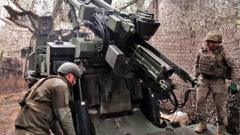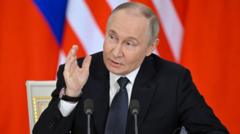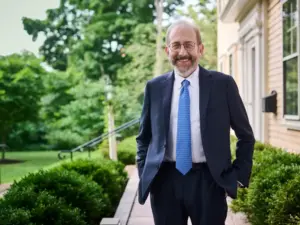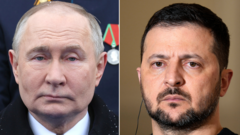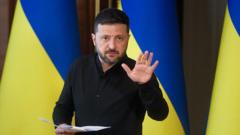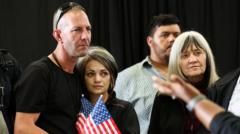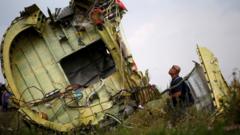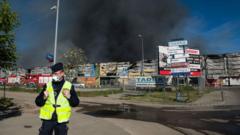**As Russia claims battlefield advantages, its diplomatic stance illustrates a stark contrast with the realities of war and negotiations.**
**Russia's Strong Arm Tactics: Battlefield Gains and Diplomatic Demands**

**Russia's Strong Arm Tactics: Battlefield Gains and Diplomatic Demands**
**Putin asserts military successes while escalating demands in peace negotiations with Ukraine.**
As the world speculates on President Vladimir V. Putin's potential presence in Turkey for peace talks this week, Russian leadership has communicated a distinct narrative: they believe they are winning the conflict in Ukraine and are entitled to assert hardline negotiating positions. In a statement made in late March, Putin asserted that Russian forces enjoyed a definitive edge across the front lines, implying a near victory over Ukrainian forces. “We have reason to believe that we are set to finish them off,” he remarked, indicating a belief in Russian momentum.
Andrei V. Kartapolov, a prominent Russian lawmaker and head of defense affairs in the State Duma, echoed Putin’s sentiment, emphasizing that Ukraine must acknowledge the Russian military’s ongoing advances across numerous sectors. He boldly stated that should Ukraine refuse dialogue, they would need to heed “the language of the Russian bayonet,” signaling a stark readiness for continued military action as a negotiation tactic.
The ongoing tension around the prospective peace negotiations showcases a tactical chess game played by both sides. While Putin proposed discussions involving mid-level delegations, the public nature of his intentions has left negotiators uncertain about his actual willingness to engage. Ukrainian President Volodymyr Zelensky has increased the stakes by insisting he will attend and expects a meeting with Putin, although the Russian leader has historically avoided direct interactions with him. Former President Trump also hinted at potentially participating if Putin confirmed his attendance.
Such diplomatic dilemmas are exacerbated for the Trump administration, as they grapple with Russian demands that seem disproportionate to their military gains. Despite some territorial advances, Russian forces are experiencing significant costs, and their assertion of a favorable battlefield situation may not fully correspond with the reality of the conflict. As uncertainty looms, the delicate balance between battlefield realities and diplomatic negotiations continues to shape the future of Ukraine’s sovereignty and regional stability.
Andrei V. Kartapolov, a prominent Russian lawmaker and head of defense affairs in the State Duma, echoed Putin’s sentiment, emphasizing that Ukraine must acknowledge the Russian military’s ongoing advances across numerous sectors. He boldly stated that should Ukraine refuse dialogue, they would need to heed “the language of the Russian bayonet,” signaling a stark readiness for continued military action as a negotiation tactic.
The ongoing tension around the prospective peace negotiations showcases a tactical chess game played by both sides. While Putin proposed discussions involving mid-level delegations, the public nature of his intentions has left negotiators uncertain about his actual willingness to engage. Ukrainian President Volodymyr Zelensky has increased the stakes by insisting he will attend and expects a meeting with Putin, although the Russian leader has historically avoided direct interactions with him. Former President Trump also hinted at potentially participating if Putin confirmed his attendance.
Such diplomatic dilemmas are exacerbated for the Trump administration, as they grapple with Russian demands that seem disproportionate to their military gains. Despite some territorial advances, Russian forces are experiencing significant costs, and their assertion of a favorable battlefield situation may not fully correspond with the reality of the conflict. As uncertainty looms, the delicate balance between battlefield realities and diplomatic negotiations continues to shape the future of Ukraine’s sovereignty and regional stability.



